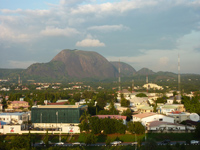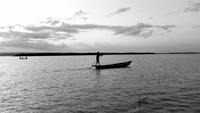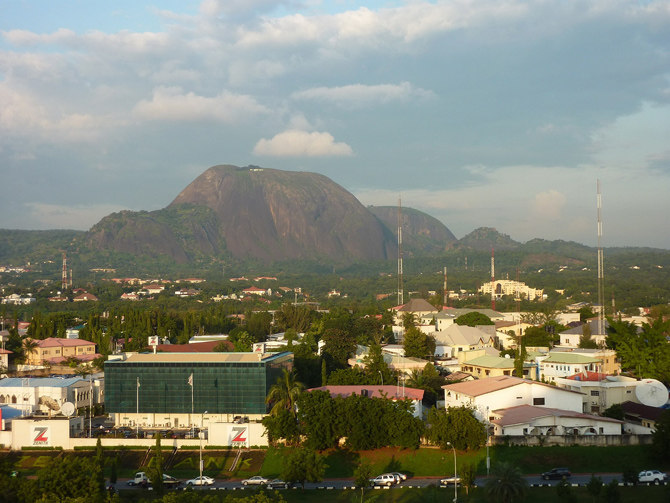Click on the map below to learn more

 |
LagosLagos is the largest city in Nigeria and the second largest city in Africa behind Cairo. It is considered one of the fastest growing cities in the world and has one of the worst quality-of-life rankings among all major cities. Formerly the capital of Nigeria, it relinquished the title to Abuja in 1991. Much of the city of Lagos is situated on three islands separated from mainland Nigeria by a channel. The islands themselves are separated from each other by a network of creeks. Lagos Island features the city's main marketplace and serves as the headquarters for most of Nigeria's banks and financial institutions. Ikoyi Island was the former headquarters of the Nigerian government and is currently the site of many hotels as well as Africa's largest golf course. Victoria Island, located to the south of Lagos Island, is home to Nigeria's wealthy citizens and aristocrats. Most of the citizens of Lagos, however, still live on the mainland. |
| Back to Map | |
 |
AbujaAubja replaced Lagos as the Nigerian capital in 1991. It was made capital because of its central location in Nigeria and because Lagos became overcrowded. The planned city has grown exponentially in recent years, making it difficult to pinpoint a population number. It is thought to be the fastest growing city in the world. In 2011, its population was estimated at more than a million people; but by 2016, it was estimated at more than three million people! Abuja's skyline is dominated by a giant, 3,000 foot-tall monolith called Aso Rock. Many of Abuja's important buildings surround the rock including the Nigerian Presidential Complex, the Nigerian National Assembly, and the Nigerian Supreme Court. |
| Back to Map | |
 |
Yankari National ParkLocated in the savannas of northeastern Nigeria, Yankari National Park was a game reserve before it became a national park in 1961. It is the most popular tourist site in Nigeria and has a played a large role in Nigeria's burgeoning ecotourism industry. Yankari features several warm water springs as well as signature African wildlife such as buffalo, antelope, and hippopotamuses. Lions formerly roamed the park but have been extirpated or virtually extirpated. Mismanagement and poaching have plagued the park since its existance and has negatively impacted wildlife such as lions and leopards. Yankari is thought to have the largest population of elephants in west Africa. |
| Back to Map | |
 |
Okomu National ParkOkomu National Park preserves the last of Nigeria's precious, coastal lowland forests - which include African mahogany trees. Less than 1/3 of the original forest remains, as Nigeria's burgeoning population and demand for lumber continues to reduce them. Okomu is home to Africa's forest-dwelling animals such as civets, chimpanzees, pangolins, warthogs, and crocodiles. It is also home to the endangered African forest elephant. Over 150 types of birds can be found in the park including parrots and hornbills. |
| Back to Map | |
 |
Port HarcourtWith a population now approaching two million people, Port Harcourt is the fifth largest city in Nigeria. It is the largest city in the Rivers State of Nigeria, which is the sixth largest state in Nigeria. Formerly an agricultural area for the Igbo people, the Ethiopian government made it a port for coal export in 1912. Today, it is the a leading center for oil export and is the nation's leading oil-refining city. |
| Back to Map | |
 |
Niger RiverAt a length of about 2,600 miles, the Niger River is the principal river of west Africa, and the third longest river in the continent. Only the Nile and Congo Rivers are longer. The Niger River originates in an area known as the Guinea Highlands and flows through Guinea, Mali, Niger, and Nigeria, before emptying through the Niger Delta into the Gulf of Guinea.
|
| Back to Map | |
 |
Benue RiverThe Benue River is one of the major tributaries of the Niger River. It extends for about 870 miles through southern Nigeria and is considered an important transportation route. It rises in the highlands of Cameroon and empties into the Niger River.
|
| Back to Map | |
 |
|
| Abuja - Bryn Pinzgauer [CC BY 2.0], via Wikimedia Commons | |
| Population: | 201,000,000 |
| Area: | 356,669 sq. miles |
| Capital City: | Abuja |
| Largest City: | Lagos |
| Currency: | Naira |
| Official Language: | English |
| GDP (Gross Domestic Product) | $447 Billion |
|
|
 |
|
| The Nigeria flag was adopted in 1960. The two green bands represent Nigeria's wealth and resources and the white central band represents peace. | |